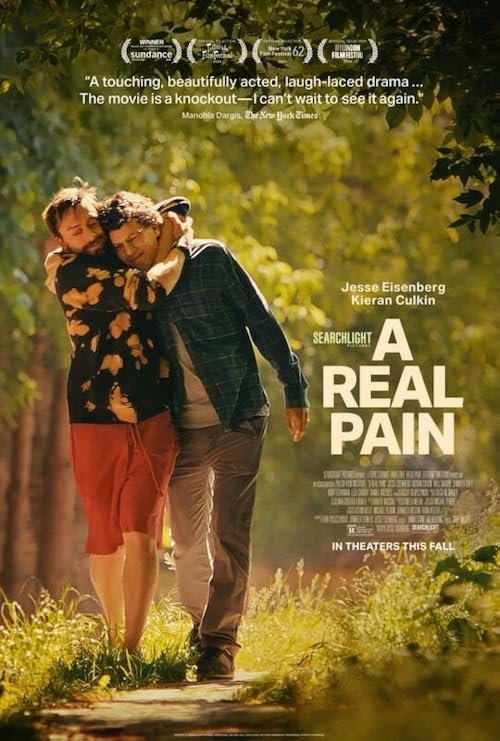A Real Pain
Written by Andreas Babiolakis
How do we decompartmentalize grief? Lord knows that when we lose loved ones that there is no correct answer as to how one should handle their anguish, just as long as we don’t vow to hurt others or ourselves. There’s no right way to grieve, and Jesse Eisenberg’s second film as a director, producer, and writer (after 2022’s When You Finish Saving the World), A Real Pain, fully understands the complexity of sifting through one’s depression post trauma. We have two characters who happen to be cousins, both of whom are on a tour in Poland to understand the history that their recently departed grandmother experienced. We have David Kaplan (Eisenberg) who is a no-nonsense introvert with a steady job (creating banner ads for websites) and a happy family. His cousin, Benji (Kieran Culkin) is a bit more of a wanderer: a pothead without a proper career who just goes where the wind takes him. Benji was closer with their grandma Dory and is experiencing both highs and lows throughout the film: an attempt to grapple with his inexplicable feelings, and failing as strongly as he succeeds. David keeps to himself and hurts in silence (with the help of pills and meditation, too).
The Polish tour will take the Kaplans to important Jewish landmarks, from burial sites to the chilling Holocaust memorials. The last leg of their trip, the Kaplans will divert from their group and will visit the house of their late grandmother. The tour proves to be a bit of a test for both Benji and David. Benji notices that there is no proper, fool-proof way to honour the dead, as he reacts to some of the traditions and services throughout the trip (including the hideous hypocrisy of traveling first class and enjoying quality meals while en route to the sites of death camps). David simply is having a tougher time because of Benji’s explosive, abrasive, unpredictable style, and it begins to take a toll on him. Both Kaplans feel like the extreme ends of how people handle pain, with Benji being outward, loud, and impossible to miss (which, in return, can be damaging to others nearby, especially when Benji gets upset). Then there’s David who suffers quietly to the point of not opening up and hurting himself. I feel like A Real Pain is about both people meeting in the middle, as to not be self destructive in either way.
A Real Pain never tries to fully answer how one should grieve, because there is no answer.
A Real Pain boasts some terrific performances, including Eisenberg’s strongest acting since The Social Network in 2010 and Culkin being as funny-yet-heartbreaking as always (see the final season of Succession for more on that); it’s no wonder why Culkin is currently the favourite to win Best Supporting Actor at the Academy Awards, seeing as he is as much of a scene stealer as he typically is. However, the real star of A Real Pain — to me — is the screenplay penned by Eisenberg, which is the kind of carefully crafted writing that I can foresee being taught in film schools down the road. From the duality of both the lead characters to the precision of what information is granted, when, and how, I feel like Eisenberg has improved as a screenwriter in ways that feel highly promising. A Real Pain is so sharply written that you just know Eisenberg has a clear grasp on how stories can be shaped as vehicles of comedy (A Real Pain is certainly a funny film), nail down all plot points with ease, and also carry enough mysteriousness that we fill in some of the film’s questions and feel like we’re a part of the journey.
The latter point leads to my only minor gripe with A Real Pain, and, perhaps, this is due to how interesting the characters of the film are: I feel like we just needed a little bit more time and context with David and Benji. We get enough to know why there’s a rift between the two of them, but I also felt like I was craving more character revelations and backstory that allows us to understand these two as individual spirits, especially since they’re both so fascinating. Even though this journey is a means for both Kaplans to better understand their late grandmother, I also felt like we didn’t get a chance to know her all too well either (even with the few stories we do get); in a film that’s about cherishing the death (as much as it is about trying to find one’s purpose while they’re alive), I feel like that was a bit of a wasted opportunity. Otherwise, A Real Pain is mostly a great dramedy that feels razor sharp. It makes sense that Eisenberg both wrote this film and acts as David, because I wish the film opened up just a little more with us (via letting us know these people more as human beings who exist and once existed, rather than characters with specific traits in a film; otherwise, A Real Pain is gorgeously vulnerable): it had the potential to be one of the finest films of 2024 (and it is certainly a highlight of the year in other ways, of course). There’s no proper way to understand grief or figure out how to deal with distress, but A Real Pain makes a great run at it that succeeds on most fronts.
Andreas Babiolakis has a Masters degree in Film and Photography Preservation and Collections Management from Toronto Metropolitan University, as well as a Bachelors degree in Cinema Studies from York University. His favourite times of year are the Criterion Collection flash sales and the annual Toronto International Film Festival.






